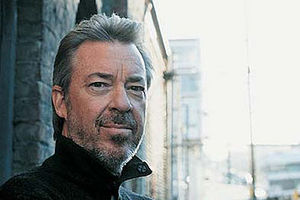Boz Scaggs Dig Interview - 2001
 Dig Talk - From BS.com/v1Kensai. Loosely translated as "just in time," the Asian approach to efficient productivity brings together just enough of the right components, at precisely the right place and time, with just the right team, to create a finished product of exacting standards and maximum utility. Dig. Boz Scaggs' new Virgin Records release and his first collection of original material in over seven years, is the musical equivalent of kensai - a "just in time" melding of the right material at precisely the right moment with exactly the right collaborators. The result is eleven original tracks that together comprise the artist's most assured and accessible collection since his 1976 landmark Silk Degrees. Firmly rooted in his abiding love and in-depth knowledge of the R&B idiom, Dig is also a stylistic tour de force showcasing the full spectrum of Boz Scaggs' remarkable musical gifts -- as a songwriter, vocalist and guitarist, as well as a consummate practitioner of creative kensai. "This project really began by setting a date," Boz explains, pinpointing the official inception of Dig to August of 2000. "Prior to that I'd spent a lot of time assembling the elements, developing material and seeking out the people I wanted to work with. That whole process took a couple of years, in and around performing concerts and generally living my life. When we got started, we were able to hit the ground running." That sprinter's stance is attributable, in large part, to the caliber of collaborators Boz tapped for Dig. "I knew going in who I wanted on board," he reveals. "David Paich is an old friend who I had not written and recorded with for years and Danny Kortchmar is, hands down, one of the most accomplished musicians I've ever known. Roy Hargrove Jr. was another key element in the mix. This was the first opportunity I'd had to work with him, although I've admired his work for years." It was around the surprisingly small core of Paich (best known for his days in Toto), Kortchmar (Don Henley, James Taylor) and Hargrove (D'Angelo) that Boz achieved the creative critical mass he sought. Additional contributions from such stalwarts as Ray Parker Jr. and Steve Lukather (guitars), Greg Phillinganes (keyboards), a sensational young drummer/percussionist, Robin DiMaggio, and a dynamic young East Bay backing vocalist named Monet brought considerable talent to add texture and nuance to the proceedings. Yet, as much as putting the proper elements in their appropriate places was essential to the work-in-progress, Boz's practiced musical instincts also allowed plenty of leeway for pure spontaneity. "I had some preconceptions about what I wanted to do, going into the album," he explains, "but, at this point, I couldn't honestly say what they were. With the people that had come together and the musical ideas we were working with, the most important thing was to step back and let it happen." Facilitating this exercise of pre-ordained serendipity was a unique blend of old-style recording know-how with a new-fangled technical edge. "We're all veteran analog guys," Boz continues. "But we also knew our way around the digital world." Small wonder. Both Boz and Paich own and operate their own studios, in San Francisco and Los Angeles respectively, where sessions proceeded at a deliberate but unhurried pace through the last half of 2000. While the recording process may have leaned heavily on the expert management of open-ended teamwork, there was no question as to the stylistic destination Boz and company had in mind. "There is a lot of diversity in these songs," he allows, "but to my ears, it all comes under the heading of R&B." The ultimate in Big Tent inclusiveness, the artist's working definition of R&B includes touches of jazz, rock and, hip-hop, which he calls "the latest expression of a constantly evolving form. The grooves, the loops, the samples are all very original and exciting, but they are also grounded in what's come before. So, naturally, that was part of our palate." Another conspicuous hue on the Dig canvas is Boz's own revitalized guitar playing. "I did a lot more guitar work on this album," he explains. "After being away from the instrument for a while I recently rediscovered it and my partners encouraged me to make use of it by creating musical settings for that to happen." The inestimable blend of camaraderie, easy-going professionalism and the common musical touchstone of R&B created an atmosphere in which Boz's original material, written primarily in collaboration with Paich and Kortchmar, was eloquently elaborated. Elements emerged from the full breadth of his career, even as they found expression in resonant and revealing new forms. The Texas native's enduring connection to the musical culture of the South finds voice in songs as varied as the honeysuckle-scented "Sarah;" the gris-gris growl of "Get On the Natch," and the outlaw aesthetic of "King Of El Paso." Boz's silken weave of Bobby Bland-style balladeering, with the sophisticated eye for detail he pioneered in the late '70's is on dazzling display with such tracks as the divine "Miss Riddle" and the cautionary "Desire." In the midst of all manners of elegant homage and echoes, Dig also brings to the surface the artist's incisive and often unsparing lyric ability to capture the most elusive of interior environments. The heartbreaking loneliness articulated in "I Just Go"; the scathing insights unveiled in "You're Not" and the quintessential alienation succinctly summed up in "Vanishing Point" mark a startling evolution in the songwriting career known for its deft stokes and telling moments. Dig, in sum, is an album that both reaches back to the essential elements of Boz Scaggs' artistry as it points the way to a fresh installment in a lifetime dedicated to music. "It's a little bit of here and now," he concludes, "and a little bit of there and then." It is also, happily, "just in time."
|
|||||||

